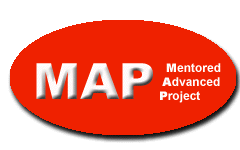
(This information is archival only.
Please refer to http://www.grinnell.edu/offices/dean/map)
What is a MAP?
Four Points | Clarification
| Why MAP?
Click
here for a Four Points electronic submission form
The Mentored Advanced Project (MAP) Definition
To replace the term "capstone," which evoked a number of objections in the course of the campus-wide discussions, we propose returning to the term "Mentored Advanced Project" or MAP, which was coined by a group of faculty members in an FFE workshop held during summer 1998. The definition of the term has evolved as the more than one hundred "capstone" projects have taken place.
The Mentored Advanced Project (MAP) can take a variety of forms, but any form must have the following features in order to be called a MAP:
1. The project is advanced.
Evidence of this feature will be that the context in which the project occurs has one or more pre-requisites above the introductory level and carries a 300-level or 400-level course designator.
2. It is the culmination of a sequence of previous academic work in one or more disciplines.
That a project is a culmination will be evidenced through a written application by the student, which would explain the relation between specific previous work and the project. Clearly, a student will need to engage in planning in order to prepare for a MAP. Such planning would be in keeping with the "Comprehensive Academic Plan" that the faculty approved and that we now require students to complete when they declare a major.
3. It is intensively mentored by one or more faculty members.
Generally, mentoring will take the form of regular (e.g. weekly) face-to-face meetings, but, if necessary, frequent electronic or telephone contact could substitute for some of these meetings.
4. It results in a product that is shared, very possibly with an audience broader than the instructor and other students in a course.
By design, the product (research paper, performance, portfolio, intellectual journal etc.) has the potential for outside evaluation, public presentation, and archiving, although in each case the faculty member and student will decide on the appropriate venue and evaluation for the specific project.
This statement was approved by the Grinnell College faculty on April 17, 2000.